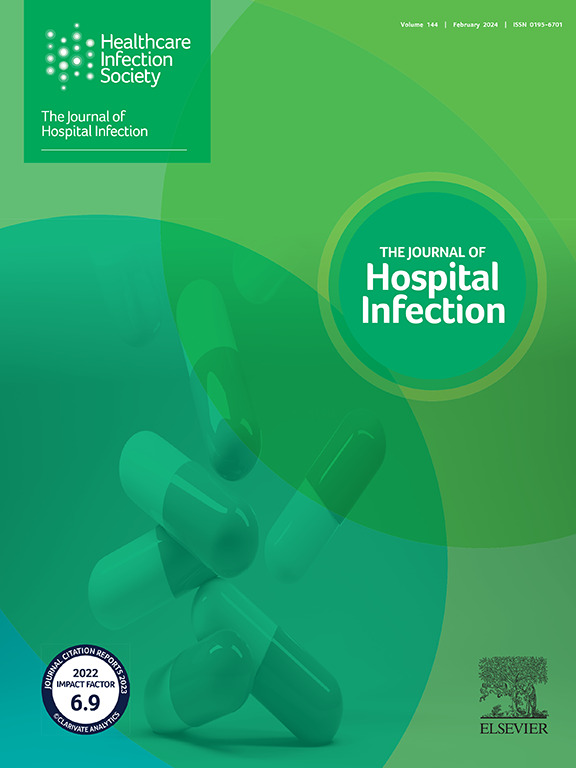入院时金黄色葡萄球菌鼻腔去菌落对减少90天内任何感染的疗效——一项系统回顾和荟萃分析
IF 3.9
3区 医学
Q1 INFECTIOUS DISEASES
引用次数: 0
摘要
背景:金黄色葡萄球菌(金黄色葡萄球菌)感染与过高的死亡率和成本相关。简单的干预措施,如非殖民化方案,可能有助于减少随后的感染,特别是在金黄色葡萄球菌具有主要临床相关性的环境中,如卫生保健相关感染。目的:确定是否金黄色葡萄球菌去菌落方案,使用鼻软膏并在入院时应用,降低感染的风险。检索方法:检索MEDLINE、EMBASE和clinicaltrials.gov中调查住院患者使用鼻软膏去菌化和90天内报告感染的所有随机对照试验。使用随机效应模型将数据汇总为风险比。使用Cochrane RoB 2工具和GRADE来评估偏倚风险和证据质量。结果:833项筛选研究中有4项(0.5%),共4150例患者符合资格标准。证据的总体确定性从低到中等不等。鼻腔金黄色葡萄球菌去菌落可能减少感染(6.9% vs 9.5%;发病率比(RR): 0.73 (95%CI 0.57;0.93))并可能增加微生物根除(82.7% vs. 55.2%;Rr: 1.80 (95%ci 0.73;4.44)。它可能不会降低死亡率(2.5 vs. 2.4;Rr: 1.02 (95%ci 0.67;1.54),但也不会导致不良反应增加(0.7% vs 0.6%;Rr: 1.01, 95% ci 0.45;2.30)。结果在亚组和敏感性分析中一致。本文章由计算机程序翻译,如有差异,请以英文原文为准。
Efficacy of Staphylococcus aureus nasal decolonization at hospital admission on reduction of any infections within 90 days – a systematic review and meta-analysis
Infections with Staphylococcus aureus are associated with excess mortality and costs. Simple interventions, such as decolonization protocols, might help to reduce subsequent infections, especially in settings in which S. aureus is of major clinical relevance, such as healthcare-associated infections. The aim of this research was to determine whether S. aureus decolonization protocols, using a nasal ointment and applied at hospital admission, reduce the risk of infection. MEDLINE, EMBASE and clinicaltrials.gov were searched for all randomized controlled trials investigating the use of nasal ointments for decolonization for patients at hospital admission and reporting on infections within 90 days. Data were pooled as risk ratios using a random-effects model. The Cochrane RoB 2 tool and GRADE were used to assess the risk of bias and quality of evidence. Four (0.5%) of 833 screened studies with a total of 4150 patients met eligibility criteria. The overall certainty of evidence ranged from low to moderate across outcomes. Nasal S. aureus decolonization probably reduces infections (6.9% vs 9.5%; rate ratio (RR): 0.73 (95% confidence interval (CI) 0.57; 0.93)) and may increase microbiological eradication (82.7% vs 55.2%; RR: 1.80 (95% CI 0.73; 4.44)) compared with placebo. It may not reduce mortality (2.5 vs 2.4; RR: 1.02 (95% CI 0.67; 1.54)) but also not lead to increased adverse effects (0.7% vs 0.6%; RR: 1.01 (95% CI 0.45; 2.30)). Results were consistent across subgroups and sensitivity analyses. In conclusion, nasal decolonization at acute-care hospital admission probably reduces the risk of infections and may result in a large increase in microbiological eradication. It may not reduce mortality and also not result in an increased number of adverse events.
求助全文
通过发布文献求助,成功后即可免费获取论文全文。
去求助
来源期刊

Journal of Hospital Infection
医学-传染病学
CiteScore
12.70
自引率
5.80%
发文量
271
审稿时长
19 days
期刊介绍:
The Journal of Hospital Infection is the editorially independent scientific publication of the Healthcare Infection Society. The aim of the Journal is to publish high quality research and information relating to infection prevention and control that is relevant to an international audience.
The Journal welcomes submissions that relate to all aspects of infection prevention and control in healthcare settings. This includes submissions that:
provide new insight into the epidemiology, surveillance, or prevention and control of healthcare-associated infections and antimicrobial resistance in healthcare settings;
provide new insight into cleaning, disinfection and decontamination;
provide new insight into the design of healthcare premises;
describe novel aspects of outbreaks of infection;
throw light on techniques for effective antimicrobial stewardship;
describe novel techniques (laboratory-based or point of care) for the detection of infection or antimicrobial resistance in the healthcare setting, particularly if these can be used to facilitate infection prevention and control;
improve understanding of the motivations of safe healthcare behaviour, or describe techniques for achieving behavioural and cultural change;
improve understanding of the use of IT systems in infection surveillance and prevention and control.
 求助内容:
求助内容: 应助结果提醒方式:
应助结果提醒方式:


